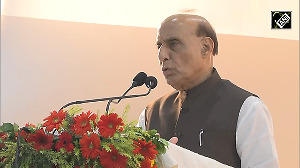American Jennifer Capriati summed up the latest tennis phenomenon with a shrug of the shoulders and a resigned expression after her semi-final defeat by Elena Dementieva on Friday.
"I think you had better get used to having at least one Russian girl in the semis from now on," the 28-year-old Capriati told reporters, and nobody present disagreed with her. The year's final Grand Slam provided more irrefutable evidence that top players are being rolled out of Moscow's tennis clubs like tanks off former Cold War production lines.
| |||||||||||
But the 19-year-old from St Petersburg blasted through the draw, dropping only one set on her way to the final where she overpowered a gallant Dementieva, who was still recovering from her thrilling battle with Capriati.
It is the first year since 1979 that three women from the same country have won the top prizes in tennis, but that only tells half the story.
A review of the women's tournament here makes scary reading for those hoping the Russian express might run out of steam.
Of the top 10 seeds at the U.S. Open, five were Russian, while eight of the 15 Russians who started out reached the third round.
Myskina, the first Russian to capture a Grand Slam at Roland Garros in June, lost in the second round, to 17-year-old fellow countrywoman Anna Chakvetadze.
Defending champion Justine Henin-Hardenne was outplayed in the quarter-final by Russian 14th seed Nadia Petrova.
STRENGTH IN DEPTH
The strength in depth is astonishing.
Kuznetsova, who also reached the doubles final with compatriot Elena Likhovtseva, said the competition between the top Russians was fuelling the trend.
"You see Myskina winning (the French Open) and you think, 'I liked that so much'," said the new U.S. Open champion.
"The same about Sharapova, the same for all of us. (Vera) Zvonareva spoke to me and said, 'I'm ranked top 10 or top 12 (in the world) but I feel like nothing because I'm only ranked six in Russia'.
"We want to play for our country, we want to be number one in Russia."
Chakvetadze, who plays at the brand new Valeri club in Moscow, said tennis had taken over from the traditional ambitions of young Russian girls.
"I was learning to be a pianist at first, then my parents suggested I take up tennis," she said. "It's really just gone from there, the clubs in Moscow are very strong and you can train with top players like (Dinara) Safina and Myskina."
Dementieva, who has now lost two Grand Slam finals this year, said public interest in women's tennis went through the roof in Russia after the French Open.
"It was huge to have two Russian women in the final of a Grand Slam, when we got back we were like super heroes," said the Paris and New York runner-up. "I think that really gave the other Russian girls a lot of self confidence."
Shamil Tarpishchev, president of the Russian Tennis Federation, warned after Myskina's French victory "this is just the beginning, every other country is scared of us, afraid of Russians taking over the game". Many laughed off his comments but as Henin-Hardenne said after losing to Petrova "the Russians are definitely coming, everybody knows that now".







